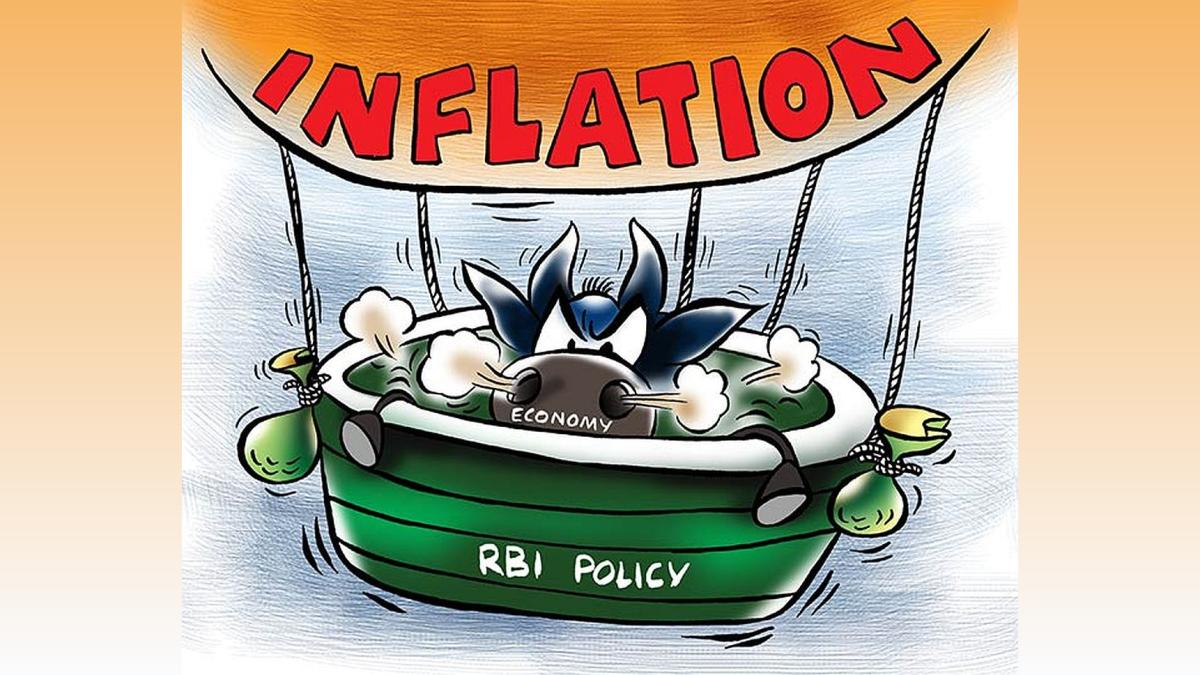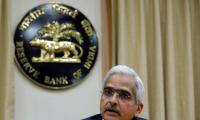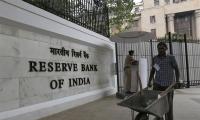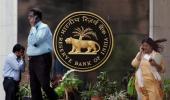RBI Keeps Interest Rates Steady: Focus on Price Stability & Growth
The Reserve Bank of India (RBI) has kept interest rates unchanged for the seventh consecutive time, focusing on price stability and sustained economic growth. Experts weigh in on the impact on inflation, growth, and the housing market.

Illustration: Uttam Ghosh/Rediff.com
Mumbai, Apr 5 (PTI) Reserve Bank's monetary policy decision of keeping the key interest rate unchanged and focus on moderating inflation shows a resolve on the part of the central bank to ensure price stability and sustained economic growth, experts opined on Friday.
The RBI kept the benchmark interest rates unchanged at 6.5 per cent for the seventh time in a row, citing concerns over food inflation in view of IMD's prediction of above-normal maximum temperatures from April to June.
As the central bank held key policy rates steady, the EMIs on home and auto loans are likely to remain stable for some more time. The RBI has kept interest rates unchanged since February 2023.
"We stand by RBI's commitment for 'unwavering focus on price stability' to ringfence the economy from global headwinds, including geo-political situation and the resultant supply chain disruptions," Assocham Secretary General Deepak Sood said.
The central bank has successfully shielded the economy from global uncertainties over the past few years, he added.
President of industry body PHDCCI Sanjeev Agrawal too said the RBI's decision on its policy rates will propel economic activity and boost economic growth.
"We expect a repo rate cut as and when headline inflation softens around 4.5 per cent," he said.
The RBI also retained its growth and inflation forecast for the current fiscal at 7 per cent and 4.5 per cent, respectively.
Raoul Kapoor, Co-CEO of Andromeda Sales and Distribution, the RBI governor highlighted how inflation is gradually decreasing and emphasised the robust growth in India's economic landscape.
"These domestic conditions of diminishing inflation and promising growth prospects set the stage for a potential rate cut. We anticipate that in the upcoming MPC meetings, the RBI will likely announce a rate cut ranging from 25 to 50 basis points, provided the current conditions continue to improve," he said.
Commenting on the monetary policy, S K Narvar, Group Chairman of Trident Realty, said the RBI's decision reflects a strategic approach aimed at nurturing economic recovery and fostering stability.
"This move is set to benefit potential homebuyers by ensuring affordability and sustaining momentum in the housing market. With consumer demand driving the real estate sector, especially in luxury housing, the decision to maintain the repo rate status quo supports feasible macroeconomic indicators and encourages new homebuyers to invest in property," Narvar said.
HS Bhatia, managing director, Kelwon Electronics and Appliances Pvt Ltd, the manufacturing partner of Daewoo India, opined that while the RBI's decision to hold the repo rate is positive for consumer durables, a wait-and-watch approach might emerge.
"Consumers may prioritise essentials if inflation remains a concern. However, a strong 7 per cent GDP growth (projection) is a confidence booster," he added.
Ayush Lohia, CEO of Lohia Auto, was of the opinion that the central bank's decision offers a sense of steadiness within the broader economic framework.
"Within the EV sector, stable interest rates can have a favourable influence on the accessibility and financing of electric vehicles, stimulating greater consumer adoption of cleaner transportation alternatives. This corresponds with our objective of advancing sustainable mobility and mitigating carbon emissions," he added.
While unveiling the monetary policy, RBI Governor Shaktikanta Das also announced several other developmental and regulatory measures.
Das announced that certain modifications to the Liquidity Coverage Ratio (LCR) framework are proposed towards facilitating better management of liquidity risk by banks.
Anil Gupta, Senior Vice President, Co Group Head-Financial Sector Ratings at ICRA, said typically the savings deposits attract a lower outflow rate of 5 per cent in the next 30 days while calculating the LCR.
However, the saving deposits mobilised through higher interest rates on saving accounts are not only interest sensitive but may also be prone to higher run-off in any adverse development at a bank, he said.
"Further, the actual outflow rates for some of the saving deposits may also be higher than 5 per cent and hence the proposal to review the LCR framework is positive from the liquidity risk management of banks," Gupta said.
Parijat Agrawal, Head - Fixed Income at Union Mutual Fund, expects interest rate cuts in the third quarter of the fiscal. He also said the RBI is expected to keep liquidity neutral so that further transmission of higher rates can continue.
Nilesh Shah, MD at Kotak Mahindra AMC, said the RBI has achieved the objective of stability, trust and growth.
Growth is higher than market expectations, Shah said, and added the market trusts the RBI to lower the inflation to midpoint.
The Reserve Bank will be releasing the minutes of the MPC meeting on April 19.
The next meeting of the MPC is scheduled during June 5 to 7, 2024.
The RBI kept the benchmark interest rates unchanged at 6.5 per cent for the seventh time in a row, citing concerns over food inflation in view of IMD's prediction of above-normal maximum temperatures from April to June.
As the central bank held key policy rates steady, the EMIs on home and auto loans are likely to remain stable for some more time. The RBI has kept interest rates unchanged since February 2023.
"We stand by RBI's commitment for 'unwavering focus on price stability' to ringfence the economy from global headwinds, including geo-political situation and the resultant supply chain disruptions," Assocham Secretary General Deepak Sood said.
The central bank has successfully shielded the economy from global uncertainties over the past few years, he added.
President of industry body PHDCCI Sanjeev Agrawal too said the RBI's decision on its policy rates will propel economic activity and boost economic growth.
"We expect a repo rate cut as and when headline inflation softens around 4.5 per cent," he said.
The RBI also retained its growth and inflation forecast for the current fiscal at 7 per cent and 4.5 per cent, respectively.
Raoul Kapoor, Co-CEO of Andromeda Sales and Distribution, the RBI governor highlighted how inflation is gradually decreasing and emphasised the robust growth in India's economic landscape.
"These domestic conditions of diminishing inflation and promising growth prospects set the stage for a potential rate cut. We anticipate that in the upcoming MPC meetings, the RBI will likely announce a rate cut ranging from 25 to 50 basis points, provided the current conditions continue to improve," he said.
Commenting on the monetary policy, S K Narvar, Group Chairman of Trident Realty, said the RBI's decision reflects a strategic approach aimed at nurturing economic recovery and fostering stability.
"This move is set to benefit potential homebuyers by ensuring affordability and sustaining momentum in the housing market. With consumer demand driving the real estate sector, especially in luxury housing, the decision to maintain the repo rate status quo supports feasible macroeconomic indicators and encourages new homebuyers to invest in property," Narvar said.
HS Bhatia, managing director, Kelwon Electronics and Appliances Pvt Ltd, the manufacturing partner of Daewoo India, opined that while the RBI's decision to hold the repo rate is positive for consumer durables, a wait-and-watch approach might emerge.
"Consumers may prioritise essentials if inflation remains a concern. However, a strong 7 per cent GDP growth (projection) is a confidence booster," he added.
Ayush Lohia, CEO of Lohia Auto, was of the opinion that the central bank's decision offers a sense of steadiness within the broader economic framework.
"Within the EV sector, stable interest rates can have a favourable influence on the accessibility and financing of electric vehicles, stimulating greater consumer adoption of cleaner transportation alternatives. This corresponds with our objective of advancing sustainable mobility and mitigating carbon emissions," he added.
While unveiling the monetary policy, RBI Governor Shaktikanta Das also announced several other developmental and regulatory measures.
Das announced that certain modifications to the Liquidity Coverage Ratio (LCR) framework are proposed towards facilitating better management of liquidity risk by banks.
Anil Gupta, Senior Vice President, Co Group Head-Financial Sector Ratings at ICRA, said typically the savings deposits attract a lower outflow rate of 5 per cent in the next 30 days while calculating the LCR.
However, the saving deposits mobilised through higher interest rates on saving accounts are not only interest sensitive but may also be prone to higher run-off in any adverse development at a bank, he said.
"Further, the actual outflow rates for some of the saving deposits may also be higher than 5 per cent and hence the proposal to review the LCR framework is positive from the liquidity risk management of banks," Gupta said.
Parijat Agrawal, Head - Fixed Income at Union Mutual Fund, expects interest rate cuts in the third quarter of the fiscal. He also said the RBI is expected to keep liquidity neutral so that further transmission of higher rates can continue.
Nilesh Shah, MD at Kotak Mahindra AMC, said the RBI has achieved the objective of stability, trust and growth.
Growth is higher than market expectations, Shah said, and added the market trusts the RBI to lower the inflation to midpoint.
The Reserve Bank will be releasing the minutes of the MPC meeting on April 19.
The next meeting of the MPC is scheduled during June 5 to 7, 2024.
You May Like To Read
TODAY'S MOST TRADED COMPANIES
- Company Name
- Price
- Volume
- Vodafone-Idea-L
- 11.65 (+ 3.56)
- 106772451
- Alstone-Textiles
- 0.28 ( -3.45)
- 44187760
- Mangalam-Industrial
- 0.88 ( -2.22)
- 39177573
- Sunshine-Capital
- 0.27 (+ 3.85)
- 35956340
- GMR-Airports
- 104.40 (+ 6.37)
- 30453005





